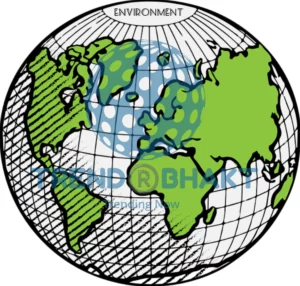Understanding the natural world and how people and the environment interact is the goal of the field of environmental science. It includes research on biodiversity, climate change, pollution, and other topics as well as ecosystems. We will discuss the definition of environmental science, its significance, and some of the fundamental ideas that make up the discipline in this post.
What is Environmental Science?
Environmental science is the study of the environment and the processes—both natural and artificial—that have an impact on it. To comprehend how various systems interact, it is an interdisciplinary field that uses concepts from biology, chemistry, physics, and other sciences. Environmental scientists work to comprehend the effects of human activity on the environment and create safeguards against those effects.

The Importance of Environmental Science
Because it enables us to comprehend the natural world and how we interact with it, environmental science is crucial. We can determine how human activities—like deforestation, pollution, and climate change—affect the ecosystem by researching it. Knowing these effects enables us to create plans to save the environment and preserve the world for future generations.
Key Concepts in Environmental Science
Ecosystems
A community of living and non-living creatures that interact with one another in a certain setting is called an ecosystem. It encompasses all of the local flora, fauna, and microbes in addition to the soil, water, and air. In order to maintain the balance of the earth, ecosystems are essential to understand in environmental science.
Biodiversity
The term “biodiversity” refers to the diversity of life on Earth, which includes all the different types of plants, animals, and microorganisms. Because it gives us access to resources like food, medicine, and other resources, biodiversity must be preserved. Additionally, it supports the resilience and health of ecosystems.
Climate Change
One of the most important environmental challenges of our day is climate change. It speaks of long-term adjustments to the climate of the planet, such as variations in temperature, precipitation, and sea level. Human actions like burning fossil fuels and deforestation are contributing to climate change, which has serious repercussions like rising sea levels. An increase in natural disasters, and a loss of biodiversity.
Pollution
The presence of substances or agents that injure living things, make them uncomfortable, or impair the environment as a whole is referred to as pollution. Numerous human activities, such as industrial processes, transportation, and agriculture, are capable of causing it. The environment can suffer greatly from pollution, including harm to ecosystems and to people’s health.
Careers in Environmental Science
A wide range of professional options are available in ecology, from policy and advocacy to conservation and restoration. Environmental scientist, conservation biologist, environmental engineer, and sustainability specialist are some of the most popular jobs in environmental science. To safeguard the environment and advance sustainability, these experts work with governmental bodies, nonprofits, and for-profit businesses.
Conclusion
We can better comprehend the natural world and how human actions affect. It thanks to the important discipline of environmental science. We may create plans to save the world and keep it in good condition for future generations by researching ecosystems, biodiversity, climate change, and pollution.
FAQs
The study of physical, chemical, and biological processes that take place in nature, as well as how people interact with and influence these processes, is known as environmental science.
Ecology is crucial because it enables us to comprehend how natural systems function and how human actions may affect them. We can use this information to inform our judgements on how to manage and safeguard our environment.
Climate change, pollution, deforestation, biodiversity loss, and resource depletion are some of the main environmental problems we currently face.
By using less energy, less water, less waste, using environmentally friendly products, and supporting conservation efforts, individuals can contribute to environmental protection.

2 thoughts on “Environmental Science: Understanding the Planet We Call Home”